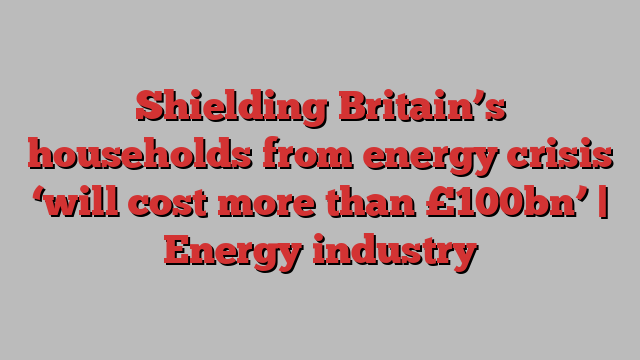
The energy industry’s favoured plan to shield Britain’s households from the soaring cost of energy will cost more than £100bn over two years, according to the boss of one of the UK’s largest power operators.
Keith Anderson is chief executive of ScottishPower, one of the big six energy suppliers, which alongside the rival firm E.ON came up with the deficit tariff scheme that was last week backed by the trade body for the sector, Energy UK.
On Friday the energy regulator for Great Britain, Ofgem, publishes its latest update to the price cap from October, which is forecast to soar from its current annual level of £1,971 to £3,582, while it could go even higher in April to as much as £4,400.
Under the ScottishPower proposals, household bills would be protected from rocketing bills by having the cap frozen around the current level, with suppliers covering the difference between that and the wholesale price of gas and electricity by borrowing from a bailout fund arranged by the government through the banks.
The cost would gradually be paid off by consumers over a period of 10 to 20 years, either through government borrowing or spread across higher energy bills, or through both of these means.
Anderson outlined the plan in the spring to the business secretary, Kwasi Kwarteng, who is tipped to become the next chancellor if, as expected, Liz Truss becomes the next prime minister, the Financial Times reported.
It was raised again with Kwarteng and Boris Johnson at their meeting with energy bosses earlier in August where the boss of Centrica is understood to have voiced support.
Anderson said the cost of living crisis caused by soaring energy bills is “bigger than the Covid pandemic”, telling STV News the cost of energy must be frozen.
Wholesale gas and electricity prices were already on the rise as the world economy recovered from the coronavirus pandemic, before Russia invaded Ukraine, which sent them soaring. Moscow has been using its control over European gas supplies in an attempt to gain political leverage.
Warnings of what will happen to Britain’s consumers without further government support continue to pour in from the energy industry.
The country is “facing a national crisis, both societally and for the economy because of this energy situation,” said Iain Conn, the former chief executive of Centrica. “Something has to be done and done quickly.”
The government has to intervene to “dramatically reduce bills this winter”, while also working internationally to bring down wholesale energy prices, Conn told BBC Radio 4’s Today programme.
“The magnitude and pace of price rises are simply impossible for customers, whether they are individuals or businesses, to plan for, manage and afford,” Conn said. He added that he was supporting Anderson’s deficit tariff plan.
On Tuesday the head of EDF Energy’s retail business, Philippe Commaret, warned that households were facing a “dramatic and catastrophic winter”, adding: “In January, half of the UK households might be in fuel poverty.”